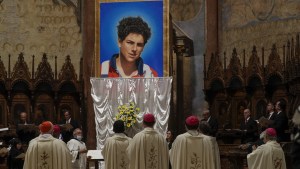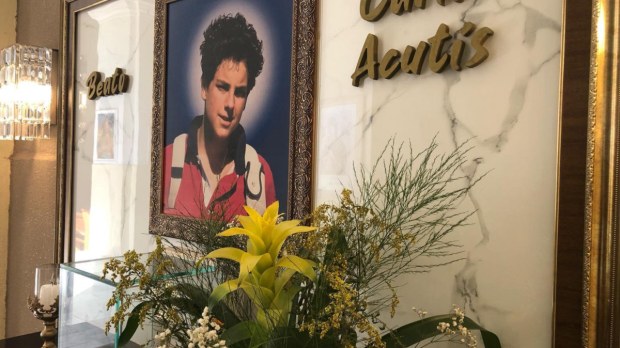Sister Miranda is the director of the school where the newly beatified computer expert, Carlo Acutis, studied. He died in 2006 at the early age of 15. She tells how part of Carlo’s greatness lies precisely in his simplicity and reserve, which at first sight made him seem like just one more ordinary kid among his peers.
Sister Miranda, thank you very much for granting me this interview for Aleteia. Can you share with us a little bit about your relationship with Carlo Acutis? How did you meet him? I know that he studied at the school run by your Congregation, the Sisters of St. Marcellina; how did this relationship between Carlo Acutis and the Marcellinas and the school begin?
Sister Miranda: In September 1999, after several years at the Aronna school in Lago Maggiore, I was transferred to Marcelline School of Tommaseo Square as the elementary school principal and a high school teacher. At that time, Carlo was in third grade, but he’d already been enrolled for a year, and was able to fit in without any problems. His home was very close to the school, and his mother often accompanied him.
As soon as I settled in, I started to get to know my colleagues and students. As far as Carlo is concerned, the most personal memories I’ve heard of him were shared with me by his religion teacher, Mrs. Isa Velati; through her I learned that he was an only child and a very sensitive child when it came to religion, so much so that he asked to receive his First Communion in Assisi in the second grade of Primary School.
Normally these subtle characteristics don’t reach the ears of the principal, and even less so if she is just joining the faculty. I remember that Mrs. Isa shared this with me immediately, adding that his parents were “very religious.” The truth is that they never talked to me about this spiritual side of Carlo or his faith: they were very discreet and gentle people, whom I only saw in the morning at the entrance of the Primary wing of the school. I never had the need to send for them because of Carlo’s behavior. At school he was well behaved, like any normal and good child of his age.
Sister Miranda, what is the main trait that you saw in Carlo? How would you describe him? How was he as a child? How did he behave in his classes? What characteristics of holiness did he already had?
Sister Miranda: I would say that he was a quiet child by nature, living in the context of a peaceful family. As time passed (also because the surname was recurrent in the media), I learned that his father, Andrea Acutis, was the manager of a large private company and that the family’s standard of living was quite high. But none of this stood out in Carlo or his parents.
Today I often see spoiled and demanding children, who are capricious with their parents, selfish with their classmates and perhaps spoiled by excessive wellbeing. There was never any sign of this in Carlo: he was a child who integrated harmoniously in the classroom, docile, with whom the teacher was happy. His parents too were very polite and unpretentious, reserved people.

Read more:
Beatification of Carlo Acutis is “good news,” says cardinal at homily in Assisi
Do you remember any anecdotes about Blessed Carlo—any conversations you had with him? What were Carlo’s aspirations, what did he think about, what games did he play? What was he like in his classes? Was he industrious? How did he behave during his exams?
Sister Miranda: Well, after so many years of reading about Carlo, I learned things that didn’t come up in school, where the boy felt at home, did his schoolwork, had good grades and was happy, like many other kids in his class, so much so that he gladly continued his high school here.
At home he showed his talents, as his mother told us on several occasions after his death. I can say that the greatest miracle I saw in Carlo is that he looked like everyone else, without making me think he was a holier or more innocent child than his peers. At that age, if the family is solid, and if the school is supportive by carrying out its educational responsibility, even the children are peaceful. And Carlo, certainly, from the way he was at school, showed that he had a family environment that helped him grow in holiness one step at a time, as Pope Francis says in his exhortation Gaudete et Exultate.
Sister, to conclude, can you share with me one last message about what Carlo represents as a saint for youth and children? What does a saint with these characteristics mean for the world, in this time where social networks and digital media are so important?
Sister Miranda: Only after his death did I know that Carlo was a genius with computers, and I was happy for him and for those whom Carlo helped (Oh! To have Carlo by my side in certain moments of … fighting with my PC!); he will probably be proclaimed the patron saint of internet users or of the net itself.
But this is not why my spirit as a Marcelline has a special affection for our former student Carlo Acutis: I feel him close to me because I share the same feeling of caring for his relationships with his classmates, giving away smiles (I remember the dimples on his chubby face as a child!), looking around him to share his goods with the dispossessed; he said “yes” to Jesus with the same enthusiasm as the first disciples, always keeping himself well rooted in reality, which for him was made of beauty, affection for parents, love for nature (including nice four-legged friends), of humble fidelity to the great gifts that Jesus himself gave him.
In this time of pandemic, when many children and young people, exasperated by the difficult health situation, seem to rebel dangerously against the rules, Carlo is a shining beacon that perhaps can enlighten them, make them wonder about the meaning of life, and about the beauty of worshiping and serving the Lord.

Read more:
Pope says Blessed Carlo Acutis shows youth where to find happiness


